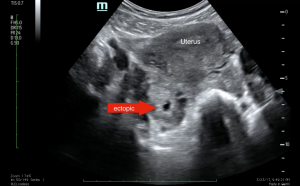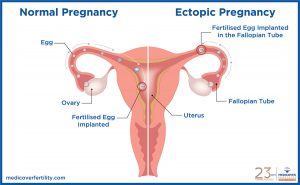Ectopic Pregnancy

An ectopic pregnancy: not the words anybody wants to hear at a doctor’s appointment. But it’s important that we talk about what exactly an ectopic pregnancy is, who is at risk, tell-tale symptoms, and typical treatment. Ectopic pregnancies are highly dangerous, and need to be taken very seriously. 1 out of 50 pregnancies are ectopic. Knowing the signs and risk factors can save lives.

What is an ectopic pregnancy?
In a normal pregnancy, conception occurs in the fallopian tube, and then the baby will travel to the uterus and implant into a soft, cushiony lining of the uterus called the endometrium. The baby stays inside the uterus until he or she is ready to be born. An ectopic pregnancy occurs when the fetus attaches outside of the uterus where it’s not supposed to be.

But sometimes instead of journeying on into the uterus where it belongs, the baby will stay inside the fallopian tube and implant there, or move elsewhere and implant in the ovary, in the abdominal cavity, or on the cervix. Most ectopic pregnancies occur in the fallopian tube, and are often referred to as “tubal pregnancies.”
A baby almost never survives an ectopic pregnancy. There have been extremely rare and unusual cases in which a baby has survived, but the odds are 1 to 3 million. These few cases typically happen outside the fallopian tubes in the abdominal cavity where blood supply is rich. Normally, a baby cannot survive because it will not get the space and supplies it needs from the uterus. The mother is at risk as well for damage to the reproductive system, and potentially death if the ectopic pregnancy goes undetected and is not treated.
Symptoms
At first a woman with an ectopic pregnancy may experience normal pregnancy symptoms: nausea, missed period, breast tenderness, mood swings, and other typical signs of pregnancy. If she takes a pregnancy test, the result will most likely be positive, but that pregnancy cannot continue normally.
Symptoms that the pregnancy is ectopic will appear as the baby continues to grow. These symptoms include:
- Pelvic, neck, abdominal, shoulder, or rectal pain and/or cramps
- Light or heavy vaginal bleeding
- Gastrointestinal symptoms, including the urge to have a bowel movement
- Extreme lightheadedness or fainting
- Sharp pain that lasts more than a few minutes
- Abnormally low blood pressure
Seek emergency medical attention if you have any signs of an ectopic pregnancy. If gone untreated, an ectopic pregnancy can lead to a rupture of the fallopian tube or other organs, and the woman could die from blood loss.
Causes and Risk Factors
An ectopic pregnancy can be caused by inflammation or scarring in the reproductive tract. A woman may be born with misshapen fallopian tubes, or have damage from an STD or tubal surgery.
Pregnant women should consider the following risk factors in monitoring for an ectopic pregnancy:
- Previous ectopic pregnancies
- Inflammation or irritation of the reproductive system, due to sexually transmitted disease or pelvic inflammatory disease
- Fertility treatments. Some studies have shown that IVF (in vitro fertilization) can increase the likelihood of an ectopic pregnancy.
- Tubal surgery. Any sort of surgery on the reproductive system could lead to scarring that in turn could cause an ectopic pregnancy.
- Intrauterine Devices (IUD). Though it is rare for a woman to get pregnant while an IUD is in place, if she were to get pregnant and IUD could prevent the fetus from implanting inside the uterus.
- Smoking. Cigarette smoking, especially right before pregnancy, could increase the risk of an ectopic pregnancy.
- Maternal age of 35-44 years
- Previous pelvic or abdominal surgery
- Endometriosis (a chronic reproductive disorder in which the uterine lining grows outside of the uterus)

Detecting an ectopic pregnancy
Always consult your doctor if you have concerns about your current or potential pregnancy. Although we can’t diagnose or treat an ectopic pregnancy, our team at Lifeline Pregnancy Help Clinic is ready to support you.
Our licensed nurses are trained in limited obstetric ultrasound, which can determine whether the pregnancy is in or outside the uterus. This no-cost, confidential ultrasound could be the first step in detecting an ectopic pregnancy. We’ll refer you to local doctors who can take it from there.
We also provide emotional support through confidential counseling at no cost to you. All of our staff are prepared to listen and be with you in this time of uncertainty. Whether the pregnancy is typical or complications arise, Lifeline is here for you.
By Kath Crane
References:
https://www.mayoclinic.org/diseases-conditions/ectopic-pregnancy/symptoms-causes/syc-20372088
http://americanpregnancy.org/pregnancy-complications/ectopic-pregnancy/
https://www.verywellfamily.com/can-an-ectopic-pregnancy-be-saved-2371464
https://www.medicoverfertility.com/blog/ectopic-pregnancy

